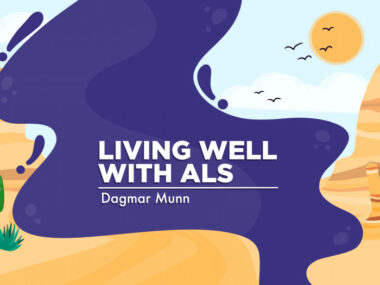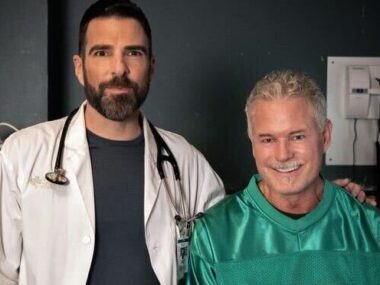Ironman Competitor Unable to Complete Race Lends a Hand, Finishes a Hero
Written by |
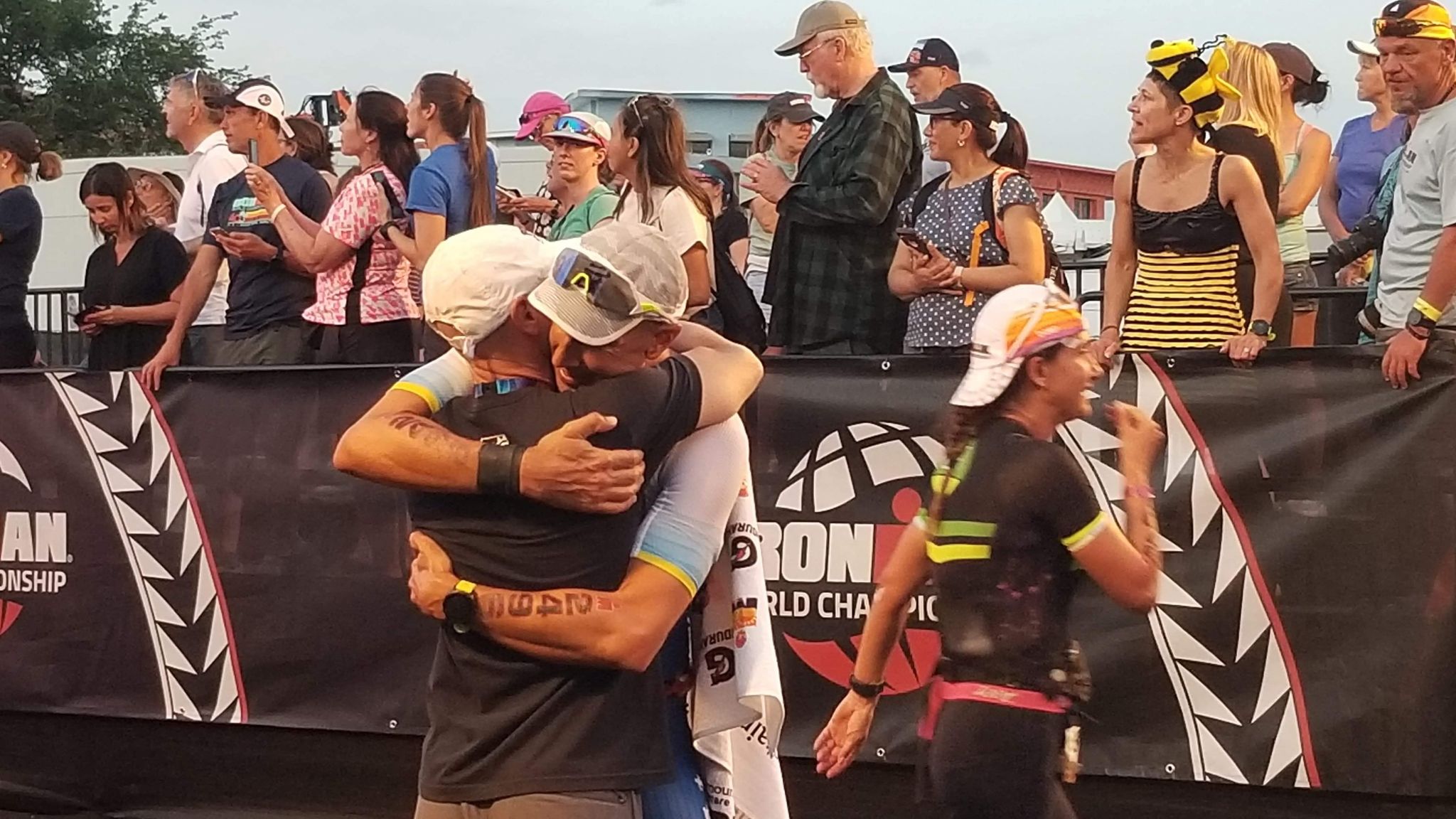
Kyle Brown and Patrick Harfield embrace at the end of the Ironman World Championship competition. (Courtesy of Kyle Brown)
Note: This story was updated June 16, 2022, to reflect that competitor Kyle Brown was not disqualified, but did not finish the swim portion of the Ironman World Championship within the time limit and was not able to move forward in the competition.
Patrick Harfield was on his last legs.
Between the elevation gain, the heat, and the cold from the swim in the Sand Hollow Reservoir, the 44-year-old experienced triathlete, competing in the 2021 Ironman World Championship in St. George, Utah, felt like giving up.
Harfield, a trainer who had competed in a handful of other Ironman races and had finished second overall in the 2021 Ironman in Waco, was on the final stretch of the May 7, 2022, makeup competition that had been postponed from last year because of COVID-19. The World Championship event consists of a 2.4-mile swim, 112-mile bike ride, and 26.2-mile foot race.
The reservoir the racers swam in was a frigid 60 degrees Fahrenheit, temperatures soared to 90 degrees during the bike ride, which included a 2,000-foot elevation gain. Harfield felt sick to his stomach and he hadn’t been able to keep any food down for most of the race.
With his energy levels plummeting, Harfield sat down on the curb to collect himself at the marathon’s halfway mark.
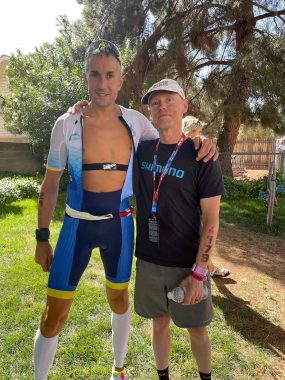
Patrick Harfield (left) and Kyle Brown competed in this year’s Ironman World Championship competition. (Courtesy of Kyle Brown)
That’s when he was approached by Kyle Brown and his wife, Colleen. Brown was unable to finish the competition because he had taken too long to complete the swim. Recently diagnosed with ALS, Brown had struggled with hypothermia and was having cramps in his legs.
Brown was watching the event when he saw Harfield laboring. He told his fellow competitor that he would be willing to walk with him for the next three hours to help him finish the race.
Brown, 52, has been cycling since he was 24, which led him into competing in triathlons around 11 years ago, and he’s been competing in half Ironmans for the past six years. In the St. George, Utah, half Ironman, also known as Ironman 70.3, Brown finished in 17th place for his age group. He rolled over the finish line wearing the number of Jon Blais, who in 2005 became the only person with ALS to complete an Ironman. He also wore Blais’ number for this year’s World Championship event.
Brown had been an athlete all his life but his ALS symptoms came on him suddenly. In May 2021, he began to slur his words. For nearly a year, his doctors wavered about whether he had ALS before settling on a diagnosis in July of bulbar-onset ALS, the most aggressive form of the disease.
He knew he didn’t have a lot of time left, but he wanted to make the most of what he had. He proposed to his girlfriend, Colleen, and they were married three weeks later. Friends set up a GoFundMe page to help the new couple check off as many bucket list items as possible, raising more than $10,000.
“We decided from day one both times I was diagnosed that we weren’t going to roll over and wait for death,” Brown said in a joint video interview with Harfield. “We’re gonna go forward 100% like we always have.”
Brown also enrolled in the HEALEY ALS Platform Trial (NCT04297683), which is testing multiple treatment candidates simultaneously to accelerate the development of ALS therapies. Brown was put on the fifth arm of the trial (NCT05136885), which is testing SLS-005 against a placebo in 160 patients. There’s a 1 in 4 chance he’s in the placebo group and says he has not felt any differently since starting it the first week of May. He travels to Phoenix every week to receive an infusion.
Brown also continues to raise money for the foundation he started with his wife, the Kyle and Colleen Brown Foundation, which supports organizations such as No More Excuses! ALS Watch Dog Group, I AM ALS, and the ALS Association.
“The athlete in me is going to fight to find a cure for this disease so then people don’t have to go through what we do,” Brown said.
The two triathletes quickly bonded as they walked the next 13 miles. They talked about where they were from, how they got into Ironman racing, and their mutual love for the sport. They shared stories, learned about each other’s lives, and shared wisdom. Brown also talked about his past experiences, including his ALS diagnosis. When Harfield felt sick from exhaustion again, they plodded ahead without talking, focusing on the task at hand.
Quitting wasn’t an option for Harfield.
“If Kyle can go through that and if Kyle can finish the swim, and obviously it was a real struggle for him, then how can I not walk, crawl, or whatever way I could get around the rest of the marathon to finish?” asked Harfield.
Harfield walked the last 5 km on his own to the finish line, avoiding what might have been the first time he didn’t finish an event. By that point he had overcome the most difficult part. Because Brown had not finished, he could not go through the checkered flag with Harfield.
But because Brown was a VIP at the race, he was able to greet Harfield once he finished. He put a towel over Harfield’s shoulders and walked with him to the finish area. It took Harfield just under 13 hours.
“It’s just a very, very emotional, very special moment and one that will remain with me forever,” Harfield said.
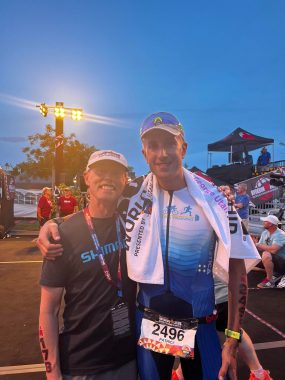
Kyle Brown greets his new friend, Patrick Harfield, at the end of the Ironman World Championship competition after helping him to complete the event last month. (Courtesy of Kyle Brown)
Harfield lives in the Cayman Islands and the two men haven’t met up since May, but they plan to reconnect as Brown prepares for his next full Ironman.
And both men hope to compete in another Ironman together. Harfield said he wants to help Brown in the same way Brown helped him. Because it’s an individual sport, participants can’t assist each other physically, but they give each other encouragement.
“As hard as something might seem physically, the mind can always overpower generally what you can physically do and Kyle certainly taught me that that day as well as many other things along the way,” Harfield said.
Harfield calls his friendship with Brown the result of a chance meeting that changed both mens’ lives.
“It was really chance meeting that I stopped only 5 meters away from Brown and it was a chance meeting that he first spoke to me and his wife’s little story of his hardships in the beginning of the day got me to to the finish line,” Harfield said in a video interview with ALS News Today.
“The time we spent together was short, it was over far too quickly, but it was some of the best three hours I spent at any race or any point in life.”





